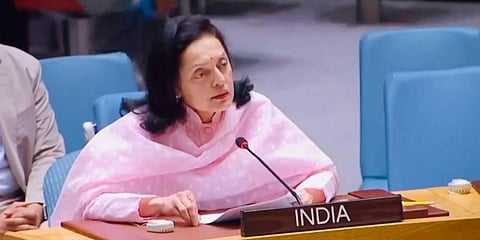

UNITED NATIONS: India has told the UN Security Council that blocking evidence-based proposals for blacklisting globally sanctioned terrorists without giving justifications is uncalled for and "smacks of doublespeak" — a thinly-veiled reference to China and Pakistan.
"The working methods of the UNSC Sanctions Committees continue to dent the credibility of the UN Security Council," India's Permanent Representative to the UN Ambassador Ruchira Kamboj said here on Tuesday.
Speaking in the Security Council's open debate on Working Methods, Kamboj said "genuine, evidence-based listing proposals for globally sanctioned terrorists to be blocked without giving any due justification is uncalled for and smacks of doublespeak when it comes to Council's commitment in tackling the challenge of terrorism."
She stressed that the working methods of Sanctions Committees must emphasise transparency, and objectivity in listing and delisting and should not be based on political considerations.
Kamboj's remarks were a veiled reference to China and its all-weather friend Pakistan. Beijing has repeatedly placed holds and blocks on bids by India and its allies to list Pakistan-based terrorists.
The latest example came in June this year when China blocked a proposal by India and the US under the 1267 Al Qaeda Sanctions Committee of the UN Security Council to designate Lashkar-e-Taiba terrorist Sajid Mir, wanted for his involvement in the 26/11 Mumbai terrorist attacks, as a global terrorist.
Kamboj highlighted that India, an eight-term elected member of the UNSC, has some key concerns about the need to improve the working methods of the Security Council.
"What we need is a Security Council that better reflects the geographical and developmental diversity of the United Nations today. A Security Council where voices of developing countries and unrepresented regions, including Africa, Latin America and the vast majority of Asia and Pacific, find their due place at this horseshoe table," she said.
India, the world's most populous nation, underscored that an expansion of the Council in both categories of membership is absolutely essential. "This is the only way to bring the Council's composition and decision-making dynamics in line with contemporary geo-political realities," Kamboj said.
She added that the international community can no longer hide behind the smokescreen of the Inter-Governmental Negotiations (IGN) in the General Assembly and continue to pay lip service by continuing to deliver statements in a process that has no time frame, no text and no defined goal to achieve.
"If countries are truly interested in making the Council more accountable and more credible, we call on them to come out openly and support a clear pathway to achieve this reform in a time-bound manner, through the only established process in the UN, which is by engaging in negotiations based on text and not through speaking at each other, or past each other, as we have done for the last three decades," she said.
Kamboj underlined that as the threats to international peace and security evolve, so must this Council. "We ask those blocking progress on this vital issue to heed the calls for genuine reform, and contribute to making this Council truly fit for purpose for the 21st century."
She noted that merely fixing the working methods of the Security Council will never be good enough to rectify its fundamental flaw, its lack of representative character. "To continue to deny member states of the Global South a voice and role in Council's decision-making only lowers the Council's credibility," she said.
Another area of concern highlighted by India was that the selection of chairs of subsidiary bodies and distribution of penholderships must be made through a process that is open, transparent, based on exhaustive consultations, and with a more integrated perspective.
"The consensus of E-10 on chairs of subsidiary bodies to be assumed by the E-10 themselves must be honoured by the P5. For the P5 to decide, even in the 21st century, as to what roles should go eventually to the E-10, reflects a continuation of the mindset of the post-1945 era: to the victors belong the spoils. This is simply unacceptable," she said.
The Security Council has five permanent members — the United States, China, France, Russia, and the United Kingdom — collectively known as the P5.
The ten elected members of the Security Council are commonly referred to as the E10.
She also pointed to the obsoleteness and irrelevance of some UNSC agenda items, asserting that there are items on the agenda of the Security Council on which discussions have not taken place since the UN's creation. "There is a case for beginning a discussion into the review of items on the list of matters of which the Council is seized," she said.